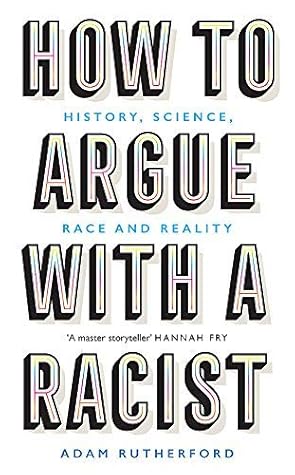More on this book
Community
Kindle Notes & Highlights
Read between
April 1 - April 2, 2020
This book is a weapon. It is written to equip you with the scientific tools necessary to tackle questions on race, genes and ancestry. It is a toolkit to help separate fact from myth in understanding how we are similar and how we are different.
Nurture – meaning the non-genetic environment – does not mean whether your parents cuddled you or ignored you as a child; it means every interaction between the universe and your cells, including how you were raised, but also everything from the orientation of you as foetus in utero, to the randomness of happenstance, chance and noise in a very messy system.
But that is why we invented science: to free ourselves from the shackles of perception, to see things – including people – as they really are.
Are fast twitch muscles cells more common in sprinters? Yes. Are they more common in West African people? Possibly. Are they more common in African Americans? Maybe a bit. Are they unique to African people? No. Does the RR allele of ACTN3 or the II allele of ACE make you run faster? No: in elite athletes, they appear to be necessary but not sufficient for athletic success.
It seems absurd to say it, but the pivotal element in being able to swim is learning to swim, rather than contesting some imaginary biological sinking factor. According to Swim USA, the official national swimming body, 70 per cent of black people in America cannot swim. A 2008 survey identified the most significant correlates with this statistic, including: having parents and friends who don’t swim; economic reasons (swim teams are mostly extra-curricular and therefore have added financial costs); access to pools and the absence of African American swimming role models.
The real-world consequence of this structural and cultural racism is that the death rate from drowning in African American children aged five to fourteen is three times higher than for white children. Racism is literally lethal.
Instead, we see a popular and sometimes academic discourse that is clouded by complexity, confounding factors and – in that elegant Darwinian phrase – ignorance begetting confidence.
IQ is not fixed during one’s life though: results tend to stabilise as you get older, but fluctuate wildly during adolescence. It can also be improved, marginally, with practice, notably when schools adopt different teaching strategies that are rewarded in standard IQ tests. This is hardly surprising as IQ is a test of current skills, which are developed, rather than some innate immutable intellectual power.
The political scientist James Flynn observed that IQ was rising in test groups on average by around three points per decade from the 1930s onwards.
In physics, the structure of most of the cosmos is unknown, and when Dark Matter is found in the next few years, our universe will quake.


